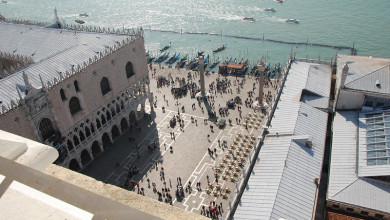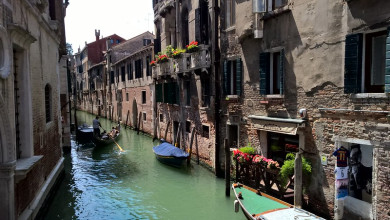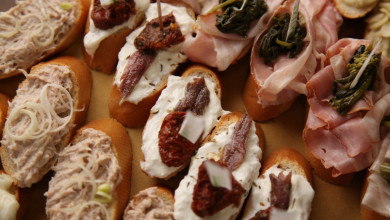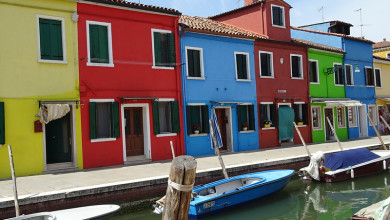Venice: an intense weekend
Itineraries
Venice city tour: first day
Our itinerary starts in the early morning from the Santa Croce sestiere (quarter in Venice), which is in the north west part of Venice. The eastern part of the sestiere, which is old and typically Venetian, is very important for trade as it connects Venice to the mainland. We recommend you take the vaporetto no. 1 and get off at the San Stae stop from where you can easily visit all the important sights in the area. From the San Stae wharf you can also admire the façade of the Ca’ d’Oro building that looks down onto the Grand Canal. The first attraction you will see will be the beautiful Church of San Stae and then you will come across the old Ca’ Pesaro palace, where the Museum of Modern Artand the Museum of Oriental Art are housed, and where we recommend you spend some time.
After visiting the museums, you can walk to Campo San Polo, one of the largest squares in Venice. We are now in the San Polo sestiere, that is surrounded by the wide circle of the Grand Canal: this is one of the smaller sestieri in Venice, but it is also the liveliest in the city: Rialto. As tradition goes, from ancient times, Rialto was one of the liveliest centers on the Venetian islands, where the first inhabitants who had fled from the mainland concentrated their trade, taking advantage of the higher more stable land, safer against floods. Rialto was the most important center of the group of islands and Rivo Altus (“high Bank”) was the name of the whole town up to the year 1000, when it then adopted the name Venice.
From Campo San Polo you can walk along the street opposite the church, lined with shops and little restaurants and you will find yourself in the middle of the Rialto Market, at the foot of the famous Rialto Bridge. After crossing the bridge and admiring the view over the Grand Canal, you can carry on the right along the Riva del Ferro towards the vaporetto stops. Take the vaporetto no. 1 or no. 2 to the Lido and get off at the San Tomà stop. As you get off the vaporetto, follow the signs to Frari and you will find yourself at the imposing Basilica dei Frari in less than one minute. The pretty Campo San Rocco is next to the Frari. Here you can see the charming Scuola Grande di San Rocco.
It will now be lunchtime and this is an interesting area as far as food goes. Go towards Campo Santa Margherita and once you get to the square, choose a restaurant or a pub where you can have something to eat and drink. You are now in the Dorsodurosestiere, that covers the southern side of Venice, including the Giudecca island. This sestiere became the favorite area for foreign residents and artists from all over the world who came to the lagoon city for inspiration, starting from the 19th century.
After eating, go to the Accademia, where you can see the wonderful works of art by Tiziano and Tintoretto and where there is the third bridge over the Grand Canal, this one made from wood and metal. After seeing the seventeenth century art, you can see some modern paintings, looking at Picasso, Boccioni, Mondrian, Kandinsky and others at the Peggy Guggenheim Collection, which is housed in the amazing Palazzo Venier dai Leoni.
Carry on in this quiet, aristocratic sestiere until you reach the Basilica della Salute, Longhena’s masterpiece that looks down onto the final part of the Grand Canal. After you have visited the church carry on along the fondamenta until you get to the most panoramic point in Venice: the Dogana della Salute where you can see San Marco bay, the Palazzo Ducale, Riva degli Schiavoni and the Island of San Giorgio with its wonderful Palladian church and where the Venetians “park” their boats, all in one go.
The Zattere, the romantic walk begins just here at the Punta della Salute on the opposite side to the Basilica. If you walk along the Giudecca canal, parallel to the Grand Canal, you will enter into a unique, relaxing dimension, and will discover sensations that the Russian writer Iosif Brodskij described in “Fondamenta degli incurabili”. The island of Giudecca is opposite you,. This island’s name has a special story, linked to its old function as a prison. The island took its name directly from a Canto of Dante’s Divine Comedy for this very reason, a canto in which the last circle of Hell where traitors of well-doers are kept. This is called Giudecca.
If you want a rest, take the chance to taste the famous gianduiotto from the ice-cream parlor “Nico”, you can sit outside on the tables on a large wooden raft on the canal. Not tired yet? Walk into the San Trovaso lanes, where there is the ancient Arts and Philosophy faculty and where you can find a typical trattoria in the area. After dinner, why not return to Campo Santa Margherita, one of the busiest Venetian nightlife areas. There will be no problem getting back to your hotel: the vaporettos go on all night!
Venice city tour: second day
The second part of our itinerary starts from the Castellosestiere, more precisely from the Arsenale, where there are findings from the ancient glories of the Serenissima. Move on to the Riva degli Schiavoni from the Shipyards and then cut across towards the inner town, until you reach Campo Santa Maria Formosa where you can admire the wonderful church.
The next stop is the San Marco sestiere, the smallest but also the most prestigious in Venice. Saint Mark's Square, “the most beautiful lounge in the world”, is the center of the sestiere. It is surrounded by wonderful works of art that cannot be missed such as: the Doge's Palace, Saint Mark's Basilica, the Belltower and the Procuratie which house the interesting Correr Museum. You can choose one of the restaurants in the area for your lunch break between one visit and another, but we recommend two historical bars for your coffee, both of which area in Piazza San Marco: Florian and Quadri.
In the afternoon, take the vaporetto # 1 from San Marco to Piazzale Roma and get off at the Ca’ d’Oro stop in the Cannaregio sestiere. This, together with Castello, is the largest sestiere in Venice. As you come out of the wharf you will immediately see the entrance to the Ca’ d’Oro palace on your left. This is one of Venice’s prides. After visiting the palace go along the Strada Nuova until you reach Rio Terrà San Leonardo. Turn right when you get to Ponte delle Guglie bridge and then right again until you get to the old Jewish Ghetto, one of the city’s more charming places. On the opposite side of Campo del Ghetto Nuovo is Fondamenta della Misericordia where you can choose one of the countless restaurants to taste some authentic local food, and can top the evening in a live music club.




